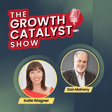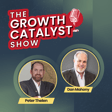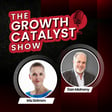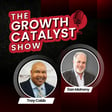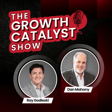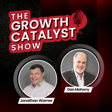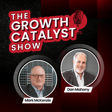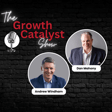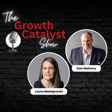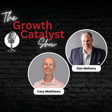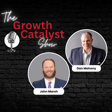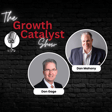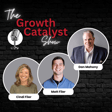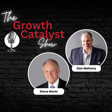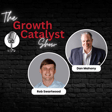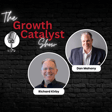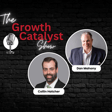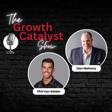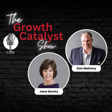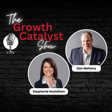Become a Creator today!Start creating today - Share your story with the world!
Start for free
00:00:00
00:00:01

Navigating Success: Jon Lassiter's Tailored Approach as a Fractional COO
Discover the secrets to Jon Lassiter's success as a Fractional COO. Learn how he customizes strategies to boost efficiency and drive business growth. Explore his innovative LMP process for overcoming operational challenges and achieving rapid expansion in multiple companies.
Transcript
Introduction to The Growth Catalyst Show
00:00:00
Speaker
Welcome to The Growth Catalyst Show, where we believe that growth can come in many forms, professional, personal, company, sales, you name it. I'm your host, Dan Mahoney, founder of Transcendent Sales Solutions and a guide to a world of growth possibilities.
Purpose of the Show: Growth Journeys
00:00:13
Speaker
I've spent my career empowering companies and their people with strategies that accelerate growth.
00:00:18
Speaker
I'm here to bring you stories of these business leaders and their trusted advisors to gain insights into their journeys and learn how they fueled their own growth. Just maybe their journey could become part of your own growth story. Are you ready? Let's grow.
00:00:34
Speaker
Welcome to the next edition of The Grow Catalyst Show. I'm your host, Dan Mahoney, and I'm so excited to have my next guest here.
Meet John Lasseter: Fractional Executive
00:00:40
Speaker
John Lasseter is the founder of Lasseter Management Partners. He is a highly skilled fractional executive and trusted advisor specializing in operations, finance, and technology. Over his impressive career, John has assisted businesses in tackling
00:00:55
Speaker
complex business challenges to meet their goals. John and his wife, Jennifer, raised their five children in the Atlanta area. John, welcome to the Growth Catalyst Show. Hey, Dan, how's it going? It's nice to be on the show. It's great to have you here. I'm so excited to learn more about your business and about you. So you're from Florida, correct?
00:01:15
Speaker
Yes, I'm from Orlando, Florida, graduated college at University of Central Florida, moved here about 19 years ago to raise my family and have the ability to see all visit all the parks here in Georgia, get outside, hike and spend some time outdoors.
00:01:35
Speaker
And there's plenty of those here in Atlanta, I'm sure they're actually a George itself, the parks. Yes, it's, it's great. There are plenty to go to. Um, recently just went up to blood mountain with three of my boys and hike to the top of blood mountains, but the afternoon there and hike back down, we absolutely love it. So, uh, talking, going back to your time, uh, growing up in the Orlando area, where did you go to school?
00:02:01
Speaker
So I was part of the charter class for a brand new high school, university high school, as a matter of fact, right near UCF. Both my older brothers went to Winter Park, that's where I was supposed to go, but it was getting too crowded with growth. And they built a school actually where my best friend's grandfather had a orange grove. So I spent many of years riding three wheelers and stuff through that orange grove, and it was really crazy for that to be turned into my high school.
00:02:28
Speaker
Wow. That's that. So it, so literally, uh, you grew up in an orange Grove where you work. Did you do a lot of work in the orange groves when you were a kid or just riding through it with the three wheeler? Just riding through with the three wheeler and his grandfather's tractor. But now I did not work the orange drove thankfully. So in college, uh, what was the plan in college going into college? Like what was your career path kind of going in?
00:02:54
Speaker
I always knew I wanted to be in business, so I focused on everything from IT to human resources to management in general and even marketing. So I really kept my education broad, knowing that leaders need to be able to pull from all those different areas, and it still serves me well today.
00:03:16
Speaker
So coming out of school, you kind of kept that path. Talk a little bit about what you did once you were right out of school. What was your first position you had?
Early Career in Automotive Advertising
00:03:25
Speaker
Yeah. So I worked for a full service automotive advertising agency in Orlando. Started out in the media department. I actually was the one that scheduled live remote sessions where the broadcasters would go out to a automotive lot for
00:03:41
Speaker
two hour period of time, giveaway prizes, broadcast live on the air. And it would be Saturdays and Sundays. And I scheduled those for car dealerships all over the United States. Worked that position for about a year and then moved into the accounting department. And about five, six years later, I was the controller of that whole advertising agency in Orlando before I moved up here to Atlanta.
00:04:06
Speaker
I, you just took me back in time. I remember as a kid growing up, listening to car dealers go and do that on the radio. That's something that they just don't do anymore.
00:04:16
Speaker
No, it is crazy. And being in that role, you were planning three, four, five months down the line. So it was like everything I was doing for it was for something in the future and then following up like the week of to make sure everybody was going to show up. And it was crazy. It just felt like it made everything go by so much faster. And things for me sort of slowed down when I went into the accounting department, because it's a lot of current, a little bit of future forecasting, but sort of looking back. And for me, that really just worked.
00:04:45
Speaker
So what positions brought you here to the Atlanta area or position, I'd say?
Transition to Media Buying in Atlanta
00:04:50
Speaker
Position brought me here to Atlanta was working for a media buying and placing agency. So they didn't actually do commercials, but it's a global company called Initiative. And they had an opening in the finance department. And it was an area where I knew I wanted to hone my skills on financial modeling, getting into analytics on the financial statement. I actually worked really close with the Home Depot's finance team, with them being a publicly traded company.
00:05:20
Speaker
I was over the whole marketing budget was about 450 million dollars and I would go over to the Home Depot campus here in Atlanta twice a month and work with them on where our budgets were actually aligning and then working on processes with our three offices. So I was in Atlanta, we had a West Coast which was for national TV and then we had a New York that was sort of print and radio.
00:05:43
Speaker
and working with the three different divisions to make sure we would reallocate. So if you missed a national TV spot, that could be a million plus. So shifting that budget, so we kept their SEC reporting variance to a minimum, and then working with their finance team twice a month of where those monies were being reallocated within their existing budgets.
00:06:28
Speaker
They take a hands-on, results-oriented approach to solving sales challenges. Visit TranscendenceSales.com to learn more and subscribe to the biweekly Growth Catalyst newsletter for insightful growth strategies. Transcendence Sales Solutions, empowering businesses to reach new heights. And now back to the show.
00:06:28
Speaker
Let's take a moment for a quick word from
Operations Management Experience
00:06:47
Speaker
So John, after that position that brought you here to Atlanta, you actually joined a company where you were working for husband and wife, two firms, correct?
00:06:57
Speaker
That's correct. Yeah. So for nearly 15 years, I worked for a husband and wife that ran two completely separate entities. They shared office space. Um, but he ran a market research company, which we ended up later on about 2015 ish, uh, flipping that to a South space company around location based insights. And then she had a law firm that was a intellectual property and
00:07:23
Speaker
a corporate law firm that we ended up growing. And in about 2021, I helped merge that into a full service firm out in Denver, Colorado. So managing operations for two very separate firms, data research and law, that had to have some challenges, correct?
00:07:45
Speaker
Yeah, there was definitely day-to-day challenges. I'd come out of a working leadership lunch for Babbage and walk into the managing partners office and be working through some strategy on maybe an upcoming merger and acquisition or potentially an issue with an existing client.
00:08:05
Speaker
Or one of the associates and sort of to flip my brain to that focus on that who am I communicating with? What's the best best way to sort of?
Founding Lasseter Management Partners
00:08:16
Speaker
navigate what needs to get done and then get back to my office and make notes from the two different meetings that I just come out of and an action based on priority those things and
00:08:28
Speaker
But in retrospect, it was a great training to get you ready to start Lassiter Management Partners. It's really sort of the catalyst that helped me make that decision about a year ago. I've done some consulting separate with a technology service company.
00:08:48
Speaker
I'm working with the CEO there that was sort of entrenched in the day-to-day and helped work through sort of some standard operating procedures from him from an accounting standpoint and an operations standpoint to where he could easily bring in a bookkeeper which I helped him identify to take some of that work off of his plate and he can focus on his core strengths.
00:09:10
Speaker
And those things just really got me thinking I did that for about a year. Things got really busy with the merger with sort of getting things on the south side for Babbage and just sort of getting pulled in between. I sort of stepped away from that. Post COVID really sort of had the itch to do what I'm doing today and I love it.
00:09:29
Speaker
So the interesting thing about your business is fractional COO. And you've mentioned it during our talk today, as you've mentioned operations, financial, technology, marketing. That's a lot of areas to touch in a fractional executive.
00:09:45
Speaker
Yeah, it is. But it's the areas that are my strength. I mean, even back when I was an accountant, maybe even bookkeeper with that full service firm in Orlando, we went through some tech upgrades. And I remember sitting in the server room working with the tech guys as we were bringing some stuff online because they needed to be off site.
00:10:03
Speaker
And, you know, it was just an area of fascination and understanding for me. So being able to balance those three aspects has always sort of been baked into my experience and my background, even working with the media buying and placing agencies, sort of the operations side and the finance side, not as much tech as that was handled out of the New York office.
00:10:25
Speaker
So what is, I'll call it a trigger that you see for a client. I mean, people don't wake up and say, you know, I think I need a fractional operations executive. You know, what brings you to the table for that?
Addressing Growth Challenges
00:10:37
Speaker
A lot of the triggers that have brought clients to me today is either the realization that they are too entrenched in the day-to-day and there has to be a better way to get things done and focus on their core competencies. Are they an attorney? They want to spend more time acquiring clients, working with their existing clients. Are they a marketing firm? They want to be creative. I take that burden of those day-to-day and that trigger for them, I take those burdens off of them.
00:11:05
Speaker
the trigger for them is realizing they're in this position where growth is a challenge because they're getting pulled into many different directions. Lawyers in the same boat where maybe an equity partner that handled some of the finance and operations is
00:11:22
Speaker
retiring or leaving the firm. And now there's that gap for the other equity partners that who's going to handle this. So having somebody with that fractional in that fractional role that has the experience across those three areas, um, it's really been great for me to step in and work with them on a part-time basis based on their budget to achieve their needs and get those components off of them.
00:11:47
Speaker
So the type of businesses you work with, of course, service-based businesses, you mentioned law firm. What are some other industries that you can help a client with?
00:11:56
Speaker
So I've got professional services firms, those that are providing services to other B2B type companies. So like bookkeeping, back office support, marketing companies, tech startups, law firms, but really the joy of what I do can go across any industry. You know, I'm in talks with several that are from healthcare to manufacturing.
00:12:20
Speaker
So areas that I don't have that much experience in those industries. But I know my area of expertise and that pretty much applies across any industry. So across the board, what do you see the biggest challenges that a lot of these companies you're working with are really facing?
00:12:38
Speaker
I think a lot of the ones that I am dealing with today really have that lack of structured processes, whether that's from the operation side, standard operating procedures, workflow optimization, sort of removing those bottlenecks or duplication of work.
00:12:55
Speaker
or on the financial side where helping them sort of translate, yes, your P&L looks great. Yes, you've got cash in the bank. Here are some tax planning things you need to be thinking about. Here are some cash flow management things you need to be worried about and planning for and interpreting sort of those financial statements and the planning aspects of finance, helping them sort of focus on that when it's necessary, but yet allowing them to have that freedom to focus on their core competence.
00:13:26
Speaker
So when you're working with these companies, they might have someone that is already doing operations, a lot of times by the CEO, they definitely have finance, they might have technology and even some marketing. Do you find that there's conflict when you're working with these folks that might be already in the company or, you know, how do they accept you in that role?
Strategic Leadership Success Story
00:13:47
Speaker
Actually, it's quite the opposite. Yes, they do have the people in those roles, but having somebody in that leadership role that understands and when they're faced with an issue helps them sort of talk through and strategize ways to deal with it. So whether that's, you know, I'm working with a client right now, all of their insurance are up for review from professional to cyber to workers comp and all of that.
00:14:11
Speaker
It is insane going through all those quotes and figuring out which is the right level of sort of risk mitigation and all of those policies. This person's done it for years. They've kind of gone by gut. Now they've got somebody they can bounce some thoughts and ideas off of based on my experience and things that I've seen and were able to put together with the agent a better protection within our budget that they didn't even know was available.
00:14:36
Speaker
Okay, that makes sense. I was looking at your website this morning and I saw something you had mentioned, the Lassiter Management Partners LMP process. Can you talk a little bit about that?
00:14:50
Speaker
So the LMP process, I usually lean on heavily in the beginning. So starting out with a client, having that discovery session, free of charge, tell me about, it's almost like, it's funny, back when I was running a team, people would come into my office, had this horrible orange couch color in my office, they would come in and tell me their problems. And it was like, comment and tell me what's going on. So I've used some of that approach to
00:15:15
Speaker
have some questions like you're doing today, guiding the conversation, but it's 90% them telling me what's going on. What is their vision? What are their hurdles? What do they want to achieve but they can't get past whatever roadblocks are in the way? And meanwhile, I'm taking notes, recording the session, and then I can interject those little pieces of hope. Yeah, we can get there. Here's a couple of things we could do. And seeing the reaction on their face is fantastic, where it's like,
00:15:44
Speaker
relief, we can get to where I want to get to without this huge expense, this huge timeline. And that's sort of we build out from there. I come in and I do in those instances that it makes sense for this client sort of an assessment.
00:15:59
Speaker
and what are the sop's what's the workflows that you have what are your roles and responsibilities where reporting structures look like how do you handle annual reviews. Do you have anything for documented for onboarding and off boarding people to make sure you know you're setting it up correctly in the beginning and you really thinking about closing it down tightly as a company at the end of that sort of employment terms.
00:16:23
Speaker
So identifying all of that in between and then giving them my overview of what I think they need to tackle and sort of a timeline. And then we iterate through that. Here are my priorities. We already have these things that they're dealing with. This is less of a priority. Here's our timeline. And then we get to work on that. And I use their team
00:16:44
Speaker
to then start working on these things. So it's not John's standard operating procedures, John's approach. It's an iterative process. So they're bought in from the beginning as we're moving these things forward. And I can hand it off when I'm done and feel confident that that team is going to run it. And then I sort of become the CEO's accountability partner. Are you still doing these things? Have you fallen back into your old habits where you just solve the problem because it's faster and easier at the moment?
00:17:11
Speaker
But long term, it's not the solution. You want to be able to entrust your team to achieve all of their roles and responsibilities, hold them accountable to that. That way you can focus on that higher level thinking.
00:17:24
Speaker
Share a success story with me based on some of the work you've done since you started LMP. So one of the stories of actually working with a back office support bookkeeping firm here in Atlanta, funny enough, I actually interviewed them to hire them for one of my law firm clients because they serve law firms in particular. And they were just onboarding a new client.
00:17:51
Speaker
With a couple other of my over the course of the next two to three weeks, a couple of other of my referral or partners in my network to see if they had availability, see if they had the right talent, ended up coming back to that company about five weeks later saying, hey, just want to check back and see how things are going. Are you at a point where you feel like you could?
00:18:11
Speaker
And we got on a call with them and they're like, we want to say yes, but we're too entrenched in the day to day help us out. So this started about October last year. I had a meeting with them about a week ago and they're able to now attend industry events that they didn't have the time to. They've added three new clients and they have added a new person to the team, all of which were things that they couldn't do six months ago.
00:18:39
Speaker
So you give this great advice and get these companies on the right path. And now as an entrepreneur, you're actually having to do it yourself for your own company. So tell me some of the things you've learned about as being an entrepreneur that you learned along the way over the last year.
00:18:57
Speaker
really focusing on marketing and sales, like getting through that LMP process that you asked me about, that's my bread and butter, I understand it inside and out. The value of building that referral network and being able to have a client say, John, we've got this need, and John being able to say, hey, I know some people, let's do an introduction, does this align, does this company align with what you're looking to do? If not, no worries, great, we'll keep looking.
00:19:26
Speaker
Um, that aspect of it is something that I never touched before thought about knew you should be doing it, but it didn't really put the value into that. So I actually spent my first two and a half to three months cultivating that network. And for me, that was,
00:19:43
Speaker
a big change coming out of my shell. You and I talked before about me going to a small business expo and actually working off of the room, doing networking and that kind of stuff. Anybody in the room known me a year ago to have been like, yeah, that's not really John's thing.
00:20:02
Speaker
I went in there with the confidence that I needed, had great conversations, came away with people that I followed up with already. These are all things that were foreign to me that I've had to learn, and I've done a lot of learning and reading, following up with people, you and I, this is how you and I connected. I saw what you do, respect what you do, know that's an area of weakness for me, reached out to you to say, hey, what do you think I should be doing differently?
00:20:27
Speaker
And you know, the amazing thing about starting a business and at the time you started it, as you mentioned, as I mentioned before, you have five kids and there, and again, I saw a picture of them, I would call them teenagers and tweenagers, I guess I would call
Balancing Business and Family Life
00:20:41
Speaker
them. So at all different ages, I mean, starting a business with kids that young is, uh, is gotta have a little bit of a level of stress as well.
00:20:49
Speaker
It was about a year ago. Yes, that was a big transition for us. But yeah, they're from 1910. But they're great kids. If I've got to work 12 hours that day, they may bring me dinner down to my office so I can just keep going or pop in to say hi.
00:21:08
Speaker
Very understanding, but the great side of it is if I need to take some time off, so again, we can go hike Blood Mountain like we talked about, or do something like that. We spent the night at the zoo with my youngest son two Fridays ago. I've got that flexibility now. I can bake that into my schedule, and I love it. Absolutely love it.
00:21:29
Speaker
Other than hiking, what are some of the other things you do with your kids? I saw you're a Cub Scout leader, I think, as well, correct? I'm the treasurer for my son's Cub Scout pack. I've been for about five years now. And other things that we do, camping, kayaking, gardening, woodworking when there's projects to be done. I love building stuff. Basically, I guess I would say an avid DIYer. And it sounds like an outdoorsman as well. A little bit, yes.
00:21:58
Speaker
So, last question for you. If someone's interested in learning more about Lassiter Management Partners, what's the best way to get in touch with you? The best way to get in touch with me is via email. It's going to be johnjon at lmpconsulting.co. John, I want to thank you for taking some time on the Growth Catalyst show today. I appreciate you joining us. This has been great, Dan. I appreciate your time as well. Thanks, everybody.
00:22:26
Speaker
And that's a wrap for today's episode of The Growth Catalyst Show. Remember, you can take these stories of growth and make them part of your own journey. Learn from them, draw inspiration, and let them guide your path of growth. I'm your host, Dan Mahoney, and I look forward to our next journey together. If you've enjoyed the show, please subscribe and leave a review. Until next time, keep growing.
